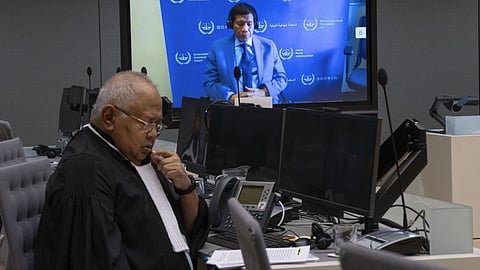
- NEWS
- the EDIT
- COMMENTARY
- BUSINESS
- LIFE
- SHOW
- ACTION
- GLOBAL GOALS
- SNAPS
- DYARYO TIRADA
- MORE

The legal challenge of the defense team of former president Rodrigo Duterte against the jurisdiction of the International Criminal Court (ICC) in an attempt to halt the confirmation of charges coming on 23 September is likely to be turned down, according to legal counsel for the drug war victims, dismissing it as a mere rehash of past rejected contentions raised by the Philippines.
ICC-accredited lawyer Gilbert Andres explained in an interview on Monday that the defense’s reasoning simply mimicked the same grounds brought up by the Philippines when it sought to block the ICC from launching a reinvestigation into the war on drugs shortly after the country withdrew from the Rome Statute in March 2019.
He claimed the defense’s thesis has a slim chance of gaining traction, pointing out that the international tribunal has already asserted its authority over Duterte’s case, as made evident by the arrest of the erstwhile leader.
“This is no longer new. In fact, this is the same ground that the Philippines set up when we appealed in 2023 when the Pre-Trial Chamber reopened the investigation [on the war on drugs]. So, we are not surprised by this,” he stated.
“This is an attempt to delay the proceedings again. Nonetheless, the victims will still provide their observations, views, and comments on this jurisdictional challenge,” Andres continued.
Last week, Duterte’s lawyers—Nicholas Kaufman and Dov Jacobs—formally contested the ICC’s jurisdiction. They argued, among other points, that Article 127(2) of the Rome Statute, which stipulates that a state shall not be discharged by reason of its withdrawal, was irrelevant and not applicable in Duterte’s case.
They asserted that the ICC "is not in a position to exercise jurisdiction in the Philippines situation after the country’s effective withdrawal from the Rome Statute."
"The jurisdictional framework of the Rome Statute is clear: A State must be a State Party at the time of the exercise of jurisdiction," the submission dated 1 May read.
Andres, however, argued otherwise. Further, he claimed that most academicians and legal scholars of international criminal law firmly believe that the ICC has jurisdiction over the case against Duterte.
To date, there has been no instance yet in which the ICC has released an accused solely on the grounds of a jurisdictional challenge, according to Andres.
The Philippines officially withdrew from the Rome Statute—the treaty that established the ICC—in March 2019 pursuant to Duterte’s marching orders.
The ICC has insisted, however, that it retains jurisdiction over crimes committed while the Philippines was still a state party to the treaty despite the country’s withdrawal.
In 2021, the ICC temporarily deferred its investigation into Duterte’s notorious anti-drug campaign at the request of the Philippine government, citing the country's own investigations into the killings.
Almost one year later, the ICC Chief Prosecutor Karim Khan reopened the investigation, saying Manila’s request was not warranted and that its reasons of lack of jurisdiction, admissibility, and complementarity were unmeritorious.
In 2023, the Appeals Chamber formally rejected the Philippines’ request.
The 80-year-old Duterte has been under the ICC’s custody since his arrest on 11 March in Manila. He faces a single count of crimes against humanity in connection with 43 extrajudicial killings committed between 1 November 2011 and 16 March 2019, spanning his time as mayor of Davao City and his presidency.
The ICC argued that such a period covers the time when the Philippines was still a member of the Rome Statute.
Kaufman had previously expressed confidence that Duterte would be exonerated at the earliest stage of the proceedings.
Duterte’s former spokesperson, Harry Roque, also an ICC-accredited lawyer, is convinced that the defense’s motion is strong in merit.
The former president will remain in The Hague while awaiting the confirmation of his charges scheduled for 23 September, although Kaufman mentioned that the application for his temporary release is already in the works—a move that lawyers for the drug war victims strongly oppose.
The government logged more than 6,000 deaths related to the anti-narcotics campaign, though rights groups estimated that the actual death toll probably exceeded as high as 30,000, affecting predominantly low-income communities.
